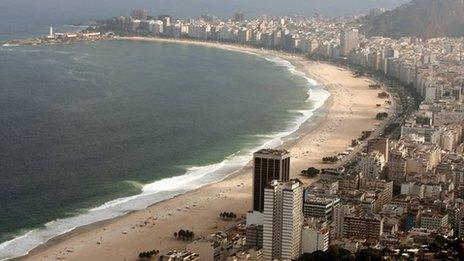Brazil looks to score sporting and economic legacy
- Published

Brazil hopes to boost the number of international visitors to well-known tourist attractions such as Copacabana beach in Rio
With the world's two biggest sporting events - the World Cup and the Olympic Games - set to be staged in Brazil within the next six years, the country is hoping to use the events to their economic advantage.
Rio will host the 2016 Olympics, while 12 venues across Brazil will host the World cup in 2014.
As well as looking to score a tourism boost - the country boasts some of the world's' most famous tourist destinations such as the beaches of Rio - the nation is eyeing other advantages across a wide range of business and social sectors,
The Brazilian tourism minister believes the city of Rio and the country as a whole can use the forthcoming major events to their benefit and hugely increase visitor numbers.
"The country can win in 2014, both on the field and off it, both in football and in business," says Luiz Barretto, minister of tourism.
"And here [at Soccerex] we have the first opportunity to start on the business side of things," he says at the Soccerex football business seminar at Forte Copacabana in Rio.
'Lasting legacy'
Brazil kicked off its 2014 tourism campaign in Johannesburg at this year's World Cup in South Africa.
And Mr Barretto believes the World Cup will help sell the country as a "a great tourist destination" and increase the number of foreign tourists from the current five million to eight million in 2014.
"The biggest year for tourism to date will be next year," says Mr Barretto, insisting that 2011 will also show the growth of the internal Brazilian tourism market, which is expected to expand alongside the overseas visitor numbers."
The city of Rio and the federal government's national economic growth acceleration plan (PAC) envisages investment of 4bn Brazilian reais ($2.33bn; 拢1.46) for the city.
The investment will be concentrated in three areas: logistics (including roads, railways, ports, waterways, and airports), energy (including generation and transmission of electric power, petroleum, natural gas and renewable energy) and various other social and urban projects.
"The World Cup is a chance for us to show Brazil to the rest of the world, and to build a lasting legacy for the country," says the tourism minister.
"The most important part of the legacy for Brazil will be the infrastructure."
Social and environmental
Infrastructure projects could help the poor who live in favela shanty towns
The urban infrastructure projects include the Light For All rural electrification programme, and improvements sanitation, housing, subways and other urban mobility plans, and water resources projects.
In addition, many important environmental projects will be implemented as part of the investment around the 2014 World Cup and 2016 Olympic games.
These include protecting the lagoon systems in Jacarepagua and at Lagaoa Rodrigo de Freitas, next to Ipanema.
There is also a plan to improve and restore parks, increase the monitoring of air, water and beach qualities, and improved flood control around the Maracana area, whose iconic stadium is scheduled to host the 2014 World Cup final.
The international airport in Rio - Antonio Carlos Jobim - has been undergoing refurbishment since March 2008, and a second phase of upgrading should be completed in time for the World Cup.
In addition, there is extensive refurbishment work being carried out on the Maracana football stadium.
Over the next six years, Rio will host not only the World Cup and Olympic Games, but also the World Military Games in 2011, as well as the Confederations Cup in 2013.
And Marcia Lins, secretary of tourism, sport and recreation for the government of Rio De Janeiro, believes the city "breathes sport" and that all these sporting events will be of great economic benefit.
Crime issue?
Work has already started on rebuilding the Maracana stadium
However, despite the glamorous image of those Copacabana and Ipanema beaches, crime in Rio remains a concern that could affect those desired tourist numbers.
Many of the favelas, the brick and tin shanty towns seen on the hillsides of Rio, which should be the biggest beneficiaries of the infrastructure projects, have experienced vicious drug-related gang war in recent years.
But Mr Barretto insists progress is being made on this front.
"The Rio governor Sergio Cabral is paying attention to this [crime] problem," he says.
"We are alert to this issue for 365 days of the year and making advances."
One big name visitor to Soccerex is confident that crime will not be an issue adversely affecting Brazil's sporting attraction to overseas visitors.
Former Dutch football legend Ruud Gullit, in Soccerex as president of the Holland-Belgium 2018 World Cup bid, says he sees similarities with Brazil's position and that of South Africa this summer.
"There were similar warnings about crime and violence and people making judgements, but there was no violence," he says.
"But the tournament gave South Africa a boost, and that can happen in Brazil, with things like infrastructure developments.
"And if Brazil can attract tourists from around the world, it can help build the country."